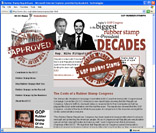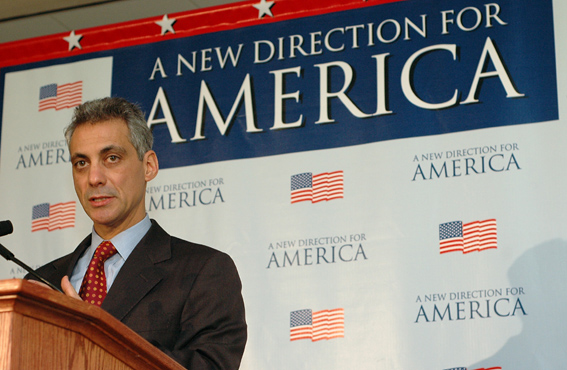


Excerpts from DCCC Chairman Rahm Emanuel's Nov. 8, 2006 press conference [rough transcript]:
...on the minimum wage, direct negotiations to lower prescription drug
prices, a vote on the 9-11 Commission recommendations, an energy policy
that doesn't take $12.5 billion and give it to big oil moving towards research
for energy independence and alternative resources, slashing interest rates
on college loans in half, and pay as you go rules on the budget, and also
on stem cell and getting a vote on that, and also on Social Security.
Candidates across the country ran on that agenda...
...One, as we mentioned many times, we were going to have a strategy to minimize our downsides, maximize our upsides. There's some dispute on history here--we have people checking on it--but as of this point not a single Democratic seat was lost, not a single Democratic seat, both incumbent or open. That has either never happened or that last time that happened [inaud...] ...Take a look at our original front line. [inaud.]; Republicans never ran an ad. Stephanie Herseth; Republicans never ran an ad. Melancon; Republicans never ran an ad. Salazar; Republicans never ran an ad. Chet Edwards; Republicans never ran an ad. Spratt; Republicans never ran an ad. Every Democrat who sought re-election is returning to the United States Congress. Ted Strickland's district, the only open seat of a Democrat which George Bush won in 2004 was carried by the Democrat with over 58% of the vote.
We set out on a strategy of recruitment. You know at this point about the recruitment team. Every morning, every Thursday, we met [inaud.], and we wanted to expand the field. Not just the races that were the obvious, but we picked targets: every open seat, every ethically challenged incumbent, somebody who had a question about their conduct in public office, and every district that John Kerry or Al Gore got 48 percent or better and held by a Republican. And that's how you expand the field, when you get people like Harry Mitchell in Arizona to run, districts like Chris Murphy against a Nancy Johnson. That's Rob Klein against a Clay Shaw. We expanded the field so we had a universe that could take advantage. What you couldn't see a year out, but which became apparent three months out was we were going to have an expanded field, with expanded opportunities for Democrats... All those candidates ran as change agents and we had the expanded field to deal with it.
Now also there was numerous veterans, but specifically five Iraq war
veterans. Four of them got elected. Tim Walz, Patrick Murphy,
Chris Carney, Joe Sestak. Tammy Duckworth did not make it, but four
of them did make it and are coming to Congress...
...A couple other things. In August of 2005 we launched the Rubber
Stamp website and the awards [inaud.] for rubber stamp members of Congress...and
that became a label Republicans did not want to see. It became a
national identity for the Republican party and the Republican Congress
and they paid a price for their blind loyalty to the president. Also
you saw in CNN's exit polls that a lot of [inaud...] not happy with the
sense of corruption around Congress. In April of 2006 we launched
from this room in this place right here the House of Scandal website and
we began [inaud...] that there was something amiss in the United States
Congress. Some, I know a lot about the other party, even some in
the press corps thought that was small, belittling, not up to the bar,
what have you, but there was a sense that this Congress was not meeting
the challenges... If you go across the list: Don Sherwood, Charles
Taylor to Tom DeLay to Richard Pombo to Curt Weldon, down in Florida; every
member--Bob Ney's seat--some of those slipped my memory; that's what happens
when you get two hours of sleep. Every member or district that had
an issue related to the professional conduct of that member switched, became
Democratic. That was eight seats; half of the 15 we needed....
In addition two other--three other points I'd like to make and then I'll take whatever questions we can here. Three points.
One. There were four districts in which the Republicans ran anti-Nancy Pelosi/liberal ads. Indiana 8th, the congressman is now Brad Ellsworth. Indiana 2, the congressman is now Joe Donnelly. Pennsylvania 10, the congressman is now Chris Carney. North Carolina 11, the congressman is now Heath Shuler. In every district the Republicans ran an ad against Nancy Pelosi and the Democratic challenger, the incumbent Republican, the news folks, from the country, the Democrats will have that seat.
Point two if I can. We set the structure here, something that David Wilhelm and I had done in 1992, and it was a model we used that David and I had created for President Clinton's '92 election that we recreated here. And that was that [inaud.] in 1992 David ran the operation of a national campaign with a strategic focus and center, and I then ran a host of fundraisers starting after Labor Day in 19 states. I ran a program with [inaud.] each state--states that we were running in. They had their own media consultant, own polling firm, own direct mail frim and we treated it like a gubernatorial race. We took that mode and put it here.
John Lapp, who I have great respect and admiration, ran the IE program--which was the independent expenditure. Which we created teams--so the same polling firm, the same media firm, the same direct mail firm, the same group worked each six races together. So we had six teams where they worked as a team; in the same way that in '92 I ran what we did in each state so we had four of us ran five states each. We had our own separate team. I wanted to do that to create accountability. We did that at the IE.
On the national level over here, helping on this side of the wall was a team of strategic people we had put around: Paul Begala, Stan Greenberg, James Carville, Bob Gersch [phon.], Rosa DeLauro and Jeff Gearen [phon.] and Chris Carney [sic.: Chris Van Hollen] and Debbie Wasserman Schultz. > That created a national strategic team here centered at the DCCC, where over at the IE was the district by district teams that John Lapp ran.
And lastly I want to take a particular time for me to thank an incredible
staff at the DCCC. Having been in a presidential campaign in '92,
a White House operation, and a presidential re-election--the first Democrat
since Franklin Delano Roosevelt to get elected--from every individual in
the press department, the research department, the field operation, the
management and the fundraising, I would take every one of these people
in any presidential campaign, and they are all presidential timber.
This was one of the best rapid response operations; it was modeled on the
'96 effort out of the White House that we did and both the press department,
the regional press people under the leadership of Bill and Sarah and Christina
Reynolds is presidential level material. And I think I know something
about fundraising and I want to tell you that I do not hold a candle to
Brian Wolff, the single best finance chairman and director the Democratic
party has from my perspective. Also to Karin Johanson, who stepped
in as the executive director and ran the operation as well as ran the field
operation and put together our get out the vote operation. As one
kid from Chicago who thinks he knows a little something about machine politics--ran
it with Michael Whouley, ran the most incredible get out the vote operation
for Democrats--42 tough-minded programs throughout the country and this
staff is bar none the best Democratic political program and team--worthy
of a presidential campaign each in their own right and together as a group
and I'm honored to be associated with them.
QUESTIONS followed...
 |
 |
| www.dccc.org/rubberstampcongress | www.dccc.org/gopauctionhouse |
|
Copyright © 2006 Eric M. Appleman/Democracy in Action |
 |